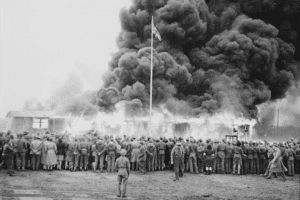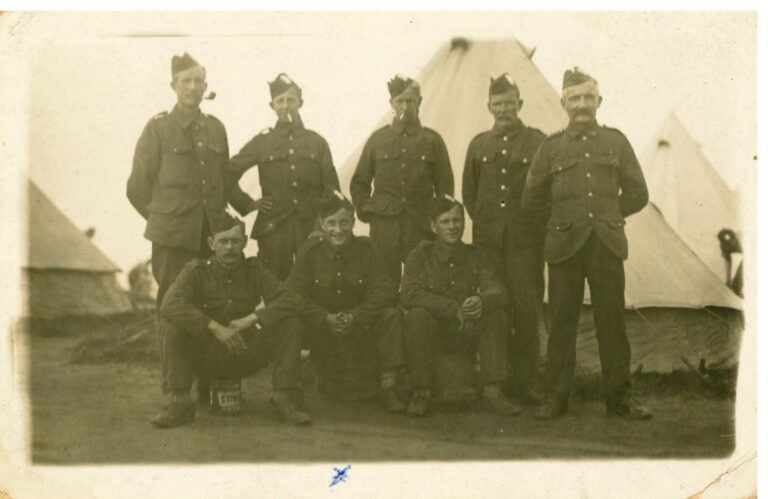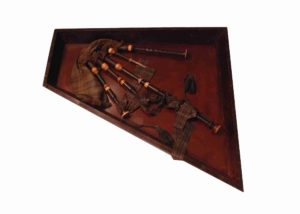
A Charred Memory: A Fragment of Bergen-Belsen at The Black Watch Museum
As the Collections Assistant at The Black Watch Museum, I spend my days surrounded by conflict-related artefacts such as medals, uniforms, letters, and photographs that
Home » Blog » Soldier Stories » Black Watch Soldier Stories – William Good


New funding provided by the Army Museums Ogilby Trust in November 2021 has ensured the Museum’s cataloguing project will continue for a further year. This phase of the ongoing project focuses on the Archive’s World War I collection. As Project Archivists, we catalogue collections of archive material relating to individual Black Watch soldiers. Our work includes arranging, describing and preserving the items, with the aim of making the collections more accessible for the public. To provide background to the collections and to better remember the soldiers they represent, we research and retell their military and personal life in the catalogues. By using records and personal documents that were donated to the Museum, we are able to provide a lens through which we can better understand the involvement and experiences of The Black Watch during the First World War.
Working with the collection these past months, I have discovered many fascinating life experiences and stories. Such a story is that of William Good, a Black Watch soldier who lied of his place of birth on his enlistment form, was captured by the Germans on the Western Front and escaped a prisoner of war camp just a few weeks before the end of the war.
William Good was born on 18th August 1895 in Manchester. He found employment as a patternmaker in a local shop and at 19 years old he attended a recruiting march for The Black Watch. In his own words, he decided to enlist, “in the spur of the moment”. Good was handed a notice after the march which read, “Recruits wanted for The Royal Highland Regiment – must be of Scottish birth”. With no Scottish roots or connections of his own, but wanting to enlist with The Black Watch, he claimed that his mother was born in Dundee. His enlistment was accepted.
After a year training in Tain, he was deployed to France and joined the 9th Battalion on the front line.

Good fought during the Somme Offensive, where he was wounded and hospitalised for 3 months. He returned to the trenches and was in action during the Battle of Arras (March – June 1917). Whilst fighting in the Second Battle of Marne (July 1918), Good was again wounded and reported missing on 28th July 1918. He was captured by the Germans near Buzancy, France. At this point of the war, thousands of men were captured and held in prison camps. During the German Spring Offensive of 1918, more than 100,000 British soldiers surrendered, and the total loss of the Allied Forces between March and April 1918 was around 330,000.

Good was sent to a prison camp in Limburg, Germany, and officially reported as a prisoner of war on 21st November 1918. It is worth mentioning the conditions and treatments captured soldiers faced in these camps.
They suffered from hunger, occasional ill-treatment and the psychological torment of their capture. The conditions varied between camps which largely depended on the camp commandant and the officers working there.
Good, escaped prison camp just a few weeks before the end of the war, by jumping on a train heading West. He managed to reach Metz, France where an American patrol picked him up. He finally returned to the United Kingdom in January 1919. Due to the conditions endured at the prison camp, he was no longer physically fit for service and was discharged from the Army.
Good remained involved with the Black Watch Association until his death in 1987. He gifted his personal collection – including photographs, newspaper articles, books and certificates to the Museum. The collection’s catalogue is available on The National Archives Website.

As the Collections Assistant at The Black Watch Museum, I spend my days surrounded by conflict-related artefacts such as medals, uniforms, letters, and photographs that
Just before heading up the stairs to Gallery 4 visitors will see the painting of someone who, on first glance, might not look like a

Rosie Waine is the William Grant Foundation Research Fellow at the National Museum of Scotland. Here she writes how the Black Watch Museum & Castle
Subscribe to Our Newsletter
© The Black Watch Castle and Museum
The Black Watch Regimental Trust is a charitable company registered in Scotland | Charity No: SC005848
